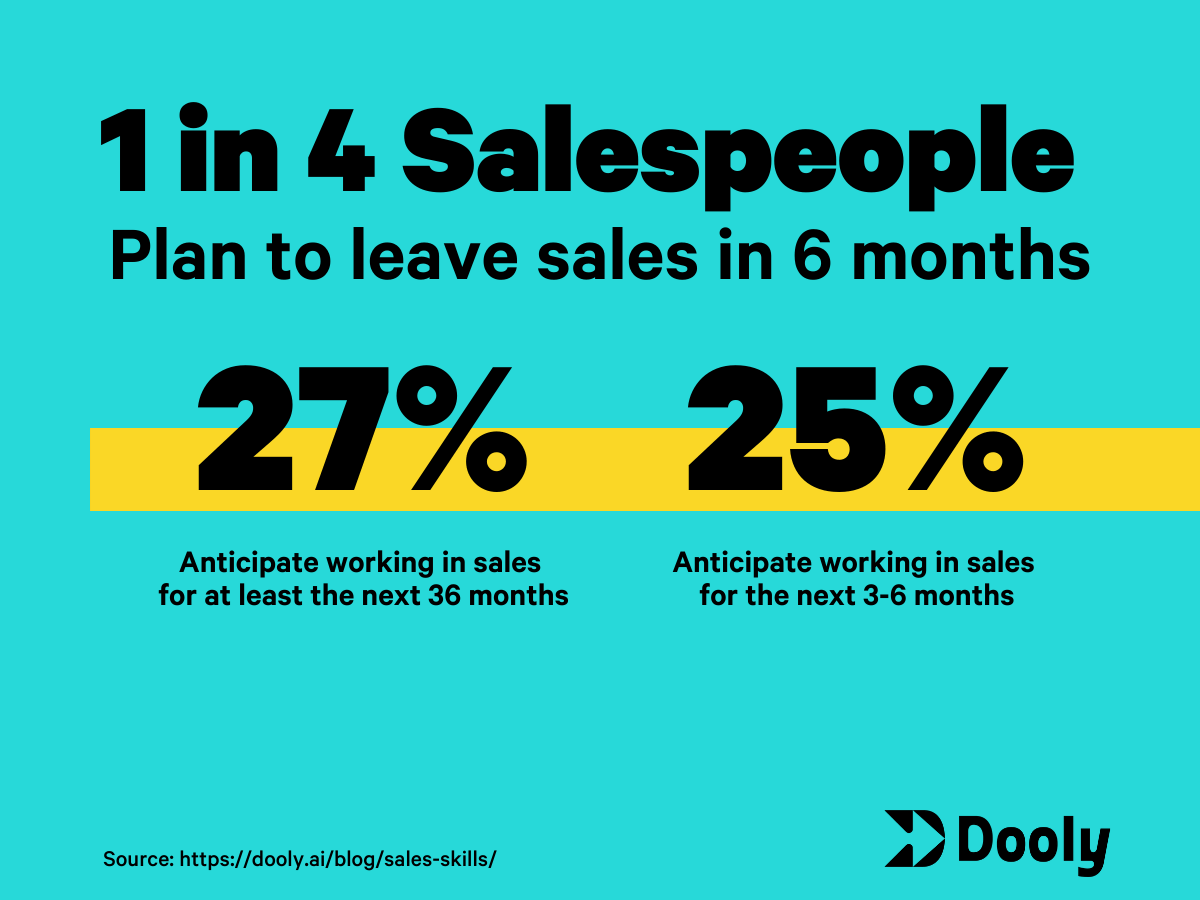
Many reps don’t stay long enough to master the skills necessary to succeed in sales.
While many people try sales, just a fraction stick it out. In fact, 25% of salespeople interviewed in Dooly’s 2021 Sales Happiness Index survey anticipated working in sales for just three to six more months.

Part of the reason for this is that sales, while not complicated, isn’t easy. The skills it takes to be a great salesperson don’t come naturally to most people, and many aren’t willing to take the time to develop themselves in ways that will make them exceptional sellers.
Of these skills, one might think that learning the sales processes or memorizing product features rank high But in reality, the most difficult sales skills don’t involve memorization, but managing relationships — with prospects, with your time, and, perhaps most importantly, with yourself.
Anybody who wants to commit to sales as a long-term and lucrative career will have to master a handful of skills.
Here are the five most difficult sales skills to master:
1. Listening
Every sales rep will, at some point, be told that listening is the number one skill they can develop. Listening allows prospects to open up and to tell us about their problems and needs (i.e., everything we need in order to close the deal). But becoming a great listener is easier said than done, especially for talkers, who might find it difficult not to interrupt when a prospect’s been speaking for a long time, or, as people tend to do, go into long meandering explanations.
The keys to becoming a great listener are learning to cope with awkward silences, actively participating in the conversation (active listening), and paying attention to what the prospect is saying as well as to what they’re implying. While it takes discipline and a bit of a mindset shift to become a great listener, it is the most important sales skill.
2. Managing your emotions
Sales is filled with ups and downs, and with various pressures and personal interactions that don’t always go as planned. For this reason, salespeople must manage their emotions, whether it’s staying level-headed when a prospect behaves in an abrasive way or not getting carried away when things are going well.
There are a few ways to manage your emotions, and there isn’t a one-size-fits-all approach. Some people are able to take a step back and view a situation dispassionately, while others use more formal techniques to get a better hold of their emotions. Things like meditating, keeping a journal, and working with a therapist are all effective ways to master our feelings, and exceptional salespeople make it a priority in ways that uncommitted salespeople will not.
3. Dealing with rejection
One of the most difficult and demoralizing aspects of sales that drives people out of the profession is rejection. The truth is that there’s no way to avoid it, no matter how good of a salesperson you might be. It’s simply a part and parcel of sales, and if someone is unwilling or unable to deal with being rejected on a regular basis, then they’ll never thrive in a competitive sales role.
A big part of effectively dealing with rejection is understanding it’s not personal. It’s just part of the job. If you understand that hearing “no” (or being ignored) after spending hours or more with a prospect is totally normal, then you’ll be much less likely to let it get you down, though experiencing negative feelings after being rejected is also totally normal. At the end of the day, you have to develop the grit to dust yourself off and keep going even after you’ve been rejected. And although this is one of the toughest things to master, once you’re able to get over it with regularity and speed, sales will become much, much easier.
4. Putting yourself in the prospect’s shoes
Most humans naturally feel some level of empathy, but salespeople must not only feel it, they must use it to their advantage. By putting yourself in a prospect’s shoes, you can understand their needs, wants, and problems. Even the most hard-nosed sales rep can develop their empathy muscle, simply by learning how to listen, ask the right questions, and read between the lines.
Some good ways to better understand a prospect’s needs are to ask open-ended questions, such as “Are there any other problems you’d like to solve,” and by paying close attention to the kinds of questions the prospect is asking. Oftentimes, their questions tell you just as much as their answers. It’s also worth ranking the prospect’s pain points by how frequently (or how long) they spend focusing on each one. But at the end of the day, as long as you’re focusing on the prospect and not yourself, you’ll be on the right track.
5. Focusing on what matters
This skill isn’t just difficult to master in sales, it’s difficult to master in life. There are always so many things competing for our attention. It can be difficult to focus on one thing for a sustained period of time — exactly what you must do to get to the next level in your sales career. Focus is critical, and focusing on the things that move the needle to the detriment of everything that does not is the trade-off one must make if they want to succeed in sales.
It doesn’t take a rocket scientist to identify the things that matter: research, prospecting, follow-up, sales presentations, and closing deals. Everything else, while it might feel important, isn’t. Sometimes, sales is about doing the tasks that don’t matter as quickly as possible so that you can focus on the things that do. Dooly helps reps do this by eliminating 5+ hours of Salesforce busywork every week.
So if you want to have a wildly successful sales career, then you need to prioritize. Once you master this skill, you’ll realize just how effective you can be when the majority of your time is spent on doing the work that matters.
Join the thousands of top-performing salespeople who use Dooly every day to stay more organized, instantly update their pipeline, and spend more time selling instead of mindless admin work. Try Dooly free, no credit card required. Or, Request a demo to speak with a Dooly product expert right now.


